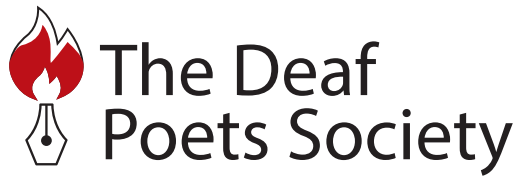Ava C. Cipri, Cyrée Jarelle Johnson, and Sarah Katz
Editor's Note
When asked to describe the body of poetry in Issue 2 of The Deaf Poets Society, the first word that comes to mind is visceral. These poems concern and complicate the disabled body by viewing the physicality of disability from another angle. It is a risk to write the disabled body into the white space of the page, and it's necessarily different work than writing about disabled experiences. This work is far more sensual; as you read, you will be confronted with internal workings of inflammation, allergies, and medication. You will be asked where love emerges, both for and from the disabled body.
Our favorite part of the issue is that it deals with the issue of pain. Lynx Sainte-Marie reminds us of the need for “Softsealedsmiles coz sometimes/ it hurts too much/ for teeth” in “Love Movement.” To read that poem is to recode fragility as lovable, and to rewrite the body in pain as inherently worthwhile, as inherently worthy of loving. In the terminal stanza of “Bananas,” Carrie Addington muses on “chronic inflammation, muscle contraction,” and “the inconvenience of swelling,” thus successfully illuminating what it feels like to recover.
Bravery is a word rarely associated with disabled people by abled folks, and yet some of us are incredibly daring. Not only in the “inspiration porn” crafted to embarrass able-bodied folks to play sports and get dates, but brave enough to look at the parts of our bodies that make us feel ambivalent, or even ashamed. In Junior Dare’s “CONSCIOUSNESS IS HARNESSED TO FLESH IS HARNESSED TO COMFORTABLE PAJAMA BOTTOMS,” we find the speaker gazing in the mirror, to find a “sweaty nightmare ass having done its best// to create conditions that are rapidly proceeding to clammy/ after the hospital i can see both hip bones, iliac crests caught// in a tight hammock of circus skin/ clowning me as is tradition.” But the speaker still looks, and survives that moment, wrestling with the disappointment as they go.
These poems are subtly political in the way that the body cannot help but to be politicized. It is radical to turn towards disabled bodies; and political not to look away. We dare you to experience the joy, the terror, the overwhelm, the disappointment of disabled embodiment, and sensuality. We challenge you to emerge unchanged.
